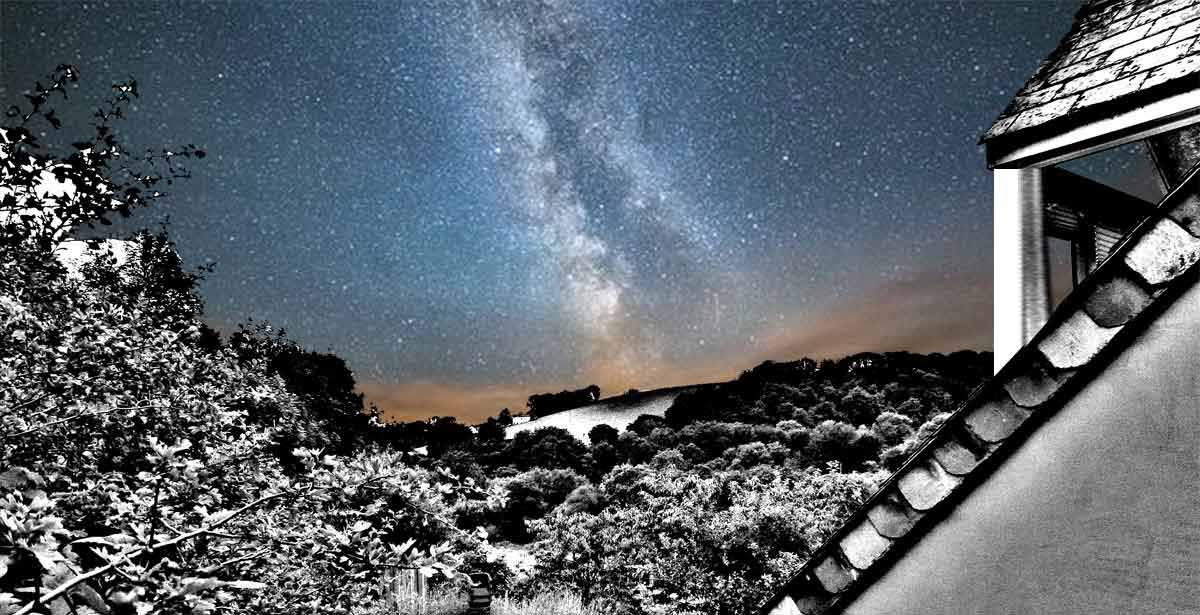
STARGAZING HOLIDAYS IN THE UK DIARY DATES FOR 2021
I hope you find these dark sky diary dates useful, and they help you to book the best nights for stargazing holidays in the UK.
The Milky Way is not just the cloud-like stretch of stars seen in the picture above, although this is the view we are all looking for. We live in “The Milky Way”, and every star you see in the sky is located within its galaxy.
A FEW TIPS FOR YOUR STARGAZING HOLIDAY IN THE UK:
- It is nearly impossible to see the Milky Way when the moon is becoming full; the moon itself is the main attraction at that time.
- The best time for stargazing holidays in the UK is when the moon is not bright. The skies are bright during a full moon, so your Dark Sky diary choices will be about two weeks every lunar month.
- It takes your eyes about 15 minutes to adjust to the dark sky.So turn off the lights and wait 15 minutes.
'WRITING SHED WALES' IS GREAT FOR STARGAZING.
The picture above is from the raised deck of 'Writing Shed Wales', and not far away in the Preseli Hills is a dedicated Dark Sky Discovery Site - Sychpant Picnic Site.So to find the best dates; whether you want a Full Moon or a Dark Sky, click the following link: https://gostargazing.co.uk/events/locations/synchpant-picnic-site
At Writing Shed Wales the Milky Way and the Constellations are visible to the naked eye, but if you want a closer view you can use the telescope at either of the big windows; in the Bedroom or in the Sitting Room. Or step outside onto the raised deck (see the picture above).
DARK SKY DIARY DATES 2021 (JULY TO DECEMBER) COURTESY OF:
HTTPS://WWW.TELESCOPEGUIDE.ORG/ASTRONOMY-GUIDE-2021-2022/
The second half of 2021 provides us with a wide range of breathtaking astronomical events!
Besides a number of opportunities to see each of the five naked-eye planets (Mercury, Venus, Mars, Jupiter and Saturn), you can catch the Perseid meteor shower and a near-total eclipse of the Moon. The list below includes some of the best stargazing & astronomical events remaining in 2021!
July 1st to 23rd – Venus & Mars
These two planets have slowly drawn closer together over the past few months. Venus is gradually moving away from the Sun, while slower-moving Mars is losing ground. As a result, the gap between the two has closed.
You can easily see them both to the west after sunset with just your eyes, but if you have regular 10×50 binoculars, you’ll see that they fit within the same field of view from July 1st to the 23rd. Better still, you can see them within the same low-powered telescopic field of view from the 11th to the 14th, with the pair at their closest on June 13th.
August 11th to 12th – the Perseid Meteor Shower
We have two meteor showers guaranteed to put on a good show every year. The first of these, the Perseids, reaches its peak in the early hours of August 12th, but you could begin your meteor watch as soon as it gets dark on the 11th.
To see the most shooting stars, be sure to get away from the bright lights of a town or city and look towards the north and east. Under ideal conditions, you could expect to see around 100 meteors an hour, and with the Moon a crescent in the evening sky, it shouldn’t brighten the sky too much.
October 25th – Mercury & Venus at Their Best
Mercury is an elusive planet, and you have to know when and where to look for it. It reaches its greatest distance from the Sun today and can be seen with the naked eye in the predawn twilight. You can find it relatively easily, low over the eastern horizon at about thirty minutes before sunrise.
Coincidentally, Venus is almost furthest from the Sun in the evening sky and appears as a brilliant white “star” in the southwest for several hours after sunset. Through the telescope, at Writing Shed Wales, both planets will appear roughly 50% illuminated, like a half Moon.
November 18th/19th – Partial Lunar Eclipse
There’s no total lunar eclipse in the second half of 2021, but November’s partial eclipse is almost as good. With 97% of its disc in eclipse, you’ll see a sliver of silvery light along its southern edge.
Partial eclipse begins at 2:18am ET on the 19th (11:18pm PT on the 18th) with mid-eclipse occurring at 4:02am ET (1:02am PT). Best of all, the eclipsed Moon will be within the same binocular field of view as the Pleiades star cluster, making this a sight worth staying up for.
December 6th to 8th – A Crescent Moon & Planets
Three planets become visible in the evening twilight at the end of the year: Venus, Saturn and Jupiter. You’ll find them almost equally spaced out toward the southwest after sunset, with the Moon passing by each of them from the 6th to the 8th.
It all starts on the 6th, when the three-day-old crescent Moon appears just to the lower left of Venus. The following night, you’ll find it to the lower left of Saturn (the faintest of the three) and then, lastly, on the 8th, the Moon appears below brilliant Jupiter.
FOR AMAZING STARGAZING IN 2022, read more: https://www.telescopeguide.org...
Further Links
To compile information for stargazing holidays in the UK, I also consultthe following sites, you might find them useful:
https://starcircleacademy.com/2012/06/milkyway/
https://www.darkskydiscovery.org.uk/dark-sky-discovery-sites/map.html
https://clearoutside.com/page/app/
https://www.lightpollutionmap.info/#zoom=6&lat=6674662&lon=66158&layers=B0FFFFFTFFFFFFFF
